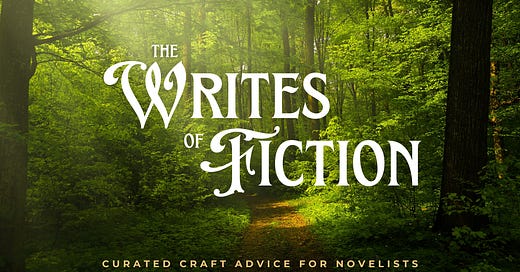Grammar habits that silence your writing voice
Writing techniques for novelists: how letting your editor pick up all the slack in your manuscript ultimately sabotages your ability to produce a stronger novel and develop as a writer.
Writers focus so much on the big craft decisions—character development, plot structure, dialogue that sings. But beneath those choices, I often discover a form of creative sabotage unfolding insidiously, one sentence at a time: the grammar and usage errors that quietly choke the life from stories.
These aren't dramatic failures or exotic sins. But grammar and usage errors chip away at a manuscript persistently enough to eventually suffocate reader immersion and trust.
But won’t your editor catch those problems? Isn’t that what editing is for?
Editing works most effectively when the writing is sound enough to support creative exploration. When the prose flows cleanly, editing can help you discover the nuances that make your writing voice distinctive. But when basic grammar and usage issues dominate the manuscript, editorial energy shifts from refinement to repair. There's simply no bandwidth left for the deeper creative work.
Authorial style grows from technical competence, not in spite of it. When you rely on editors to catch and correct fundamental grammatical and usage errors, you miss the chance to develop your own mastery.
The writers who grow strongest are those who learn to recognize and fix these issues themselves, freeing their creative energy for the deeper work where unique writing voice truly lives.
Let’s get nitty-gritty in this issue of The Writes of Fiction:
Defending the use of adverbs
Forming plurals and plural possessives
Stamping out “could of”
Removing commas after a short introductory phrase
Before we get started, summer is a perfect time to get clear on where your manuscript stands and what it needs next. Whether you need a manuscript strategy session, DIY Blueprint consultation, or First Look to see if you're ready for editing or querying, early assessments show you what's already working and what needs attention before your next steps. Look over the different ways I can help, then book a session with me—let's get your book moving forward. (Or if you’re ready to roll, I offer editing too.)
Defending adverbs exuberantly if conditionally
… There are at least two craft lessons I’d draw from the example. (And yes, they are lessons I learned in an MFA program.) The first is that if your dialogue is strong and clear, you don’t need an adverb. If you write “Fuck you!” Kurt said angrily, you’re just giving the reader the same information twice. Kurt is mad. We can assume that from “Fuck you!”
The second principle is the classic yet frequently misunderstood “show don’t tell.” The misunderstood part of “show don’t tell” is that many people—including some creative writing professors—have gotten the idea that “show don’t tell” means it is bad to ever have characters think about ideas, principles, politics, and such. No. That’s silly. But it is true that if you can get the same information across either by flatly telling it or by giving the reader a visual image, the latter is typically stronger. If the information is “Kurt is angry” then Kurt was angry is (in most circumstances) duller than Kurt said, trembling, red in the face.—Read other contributor’s creative rules via Lincoln Michel at Counter Craft.
More on the importance of mastering usage: Leaving basic errors in your manuscript is a choice to spend your money and your editor’s focus at a mundane level. Some editors enjoy chugging through the basics. More mistakes equal more money equals happy editors, right? I’m a trained copyeditor, a skill I bring to bear during your later edits—but my specialty is line editing, a level of focus we won’t reach if you’re still mangling dialogue mechanics. Leaving those messes in your manuscript for me to deal with would make me an unhappy editor.
… Start by learning the conventions of the written word, especially as used in writing fiction. Everybody makes the occasional typo. We’ve all typed it’s for its in the heat of the moment; typos are one of the things editors are here to catch.
What’s not okay is failing to learn or care about the conventions of the language you write in. Nobody expects you to acquire an editorial level of knowledge and resources. But if you consistently struggle over where to put the comma in relation to quotation marks, slow the heck down and sort it out. Your readers, agents, editors, and publishers expect you to have mastered these things, as someone who works professionally with words.
The better you get at creating a solid ground floor for your book, the sooner your edits can move on to the next level.—Read more at Avoid this editing misconception that sabotages your writing.
Proper plurals and possessives
One glass; five glasses (watch your intake there, Hemingway). One godawful mess in government; messes galore everywhere. One biceps; both your biceps. (Just making sure you’re paying attention! But indeed, both the plural and singular of biceps—and triceps and quadriceps—is the same, with the final -s. Because Latin. Look at you, pumping up your brain right along with your muscles.)
One Smith, all the Smiths. One Phelps, four Phelpses. How hard is that? And yet my own family sometimes refers to themselves as the Yates—as if referring not to a group of individuals but the singular head of Clan Yates. I picture my brother in a kilt proclaiming, “I am the Yates!”—Read the rest from Tiffany Yates Martin at Writer Unboxed.
More on checking tricky usage: If you’ve never used Microsoft Word’s Track Changes feature before, the idea of getting your manuscript back from an editor filled with all sorts of lines and squiggles you have to do something to in order to keep your novel from plummeting precipitously through a fiery ring of digital destruction and disappearing into the black maw of—
Okay, seriously, Track Changes isn’t really that terrifying.
I haven’t had a Track Changes-related death among my clients yet, so my track record of getting people through this process seems pretty reliable. You can survive the revision process, too, with my refreshed how-to guide to revising your manuscript after an edit.—Read more at The writer’s guide to Track Changes.
Could’ve vs. could of
Could've is pronounced just like could of. But don't confuse them. You always want the contraction of could and have. Never use of.—Listen in at Grammar Underground with June Casagrande.
More on proofreading help: What if you skipped paying for a professional editor and crowdsourced your editing instead? Or what about your neighbor who’s a retired English teacher? She says she’d only charge $200 to edit the entire book, and you know how sharp she is based on painful experience.
Couldn’t you save big money with crowdsourced editing? You could—but you wouldn’t be getting the kind of professional editing that turns out a professional-quality book.
… The problem is that someone who’s not a professional editor isn’t even aware of the things about editing they don’t know.—Read more at Should you use volunteers to proofread your book?
Comma after a short introductory phrase
But the longer the introductory matter, the greater the likelihood a comma will help. … It’s just one of many areas of the language in which good judgment reigns supreme.—Read the advice from June Casagrande at Grammar Underground.
More on style and usage choices: Why does your editor keep changing grey to gray in your book? You like the way grey looks. It’s listed in Merriam-Webster as a “variant spelling of GRAY”—that makes it legit, right?
Unfortunately, mixing American vs. British English doesn’t work that way.
For an everyday Joe, mixing English usage from all parts of the world creates no issues. If you like the way the Brits spell theatre, go for it; countless American theaters seem to think it looks more elegant and do exactly that.
But in publishing, conventions of usage characteristic of regional language (whether that’s American English, British English, Australian English, Canadian English …) are handled with more care. Amazon has been known to warn authors and even remove books from sale due to “errors” in books in cases of mixed American vs. British English. It’s an important detail for professionally published books.—Read more in Regional English: Graying out the differences.
Fiction Fuel
I am always doing what I can't do yet in order to learn how to do it.—Vincent Van Gogh (via James Clear)
Mastering your craft
When you master the fundamentals of writing for yourself, your relationship with your prose shifts. You stop second-guessing every sentence and start trusting your instincts. Your writing gains the kind of confidence that readers feel immediately—the assurance that comes from a writer who knows their craft inside and out.
The grammar errors we've explored today might seem minor compared to plot holes or character arcs, but they're the foundation everything else rests on. Clean them up, and suddenly you have so much more mental space for the storytelling choices that will make readers forget they're reading words on a page at all.
Onward,
Lisa
P.S. 📅 Save the date for our next Office Hours call for upgraded Writes of Fiction subscribers: Thursday, August 28 at 1:00 p.m. US Central.
Office Hours brings writers together to chat about writing and storytelling strategies. Spend a whole hour with me and my buddy Beth Hill (The Magic of Fiction) covering your questions about writing fiction. We typically tumble into impromptu classes on the issues we’ve recently been editing, coaching, and writing about, so come discover something new about writing with us.
Subscribe now to join in. A paid subscription is only $8 a month—a monthly coffee date for writers!
This is The Writes of Fiction, a slow-simmered assortment of old and new thinking about writing fiction, assembled at my desk, not by algorithm.
And this is what happens when copy assistant Rémy finds a manuscript riddled with grammar and usage errors. 👇






